Queer Lives: Narrations of Work Abroad (June 6)

My morning commute to work is five kilometres and thirty minutes long, passing through motorways, the smallest of side streets, university courtyards, and hilly markets. Usually, I put on my headphones and watch the ever-changing surroundings, each frame gone before I can capture it. I’ve recently been listening to live recordings of concerts. Something about hearing the audience – shouting, disjointed, slightly off-key – is grounding. Driving through the city, music blasting, and U2 singing somewhere in the heart of Italy, joined by a crowd of millions (and me, humming along as quietly as possible).
My morning commute is also, without fail, a literal death trap. For the entire five kilometres and thirty minutes between Bandra and Kalina, I sit in a three-wheeled, doorless, windowless, bright yellow tin car of doom – or, as it’s better known, the auto rickshaw. Autos are a staple of the Mumbai scenery, zipping between cars and squeezing into turns that seem physically impossible, and they are, by far, the most convenient way to commute. Every time I sit in one, though, I’m convinced that I’m going to fall out, headfirst, dragging my oversized backpack along for the ride.
Today, I’m perched precariously in the middle of the seat, bag tucked to my chest and knees hitting the metal plate that separates driver from passenger. The rains have returned with a vengeance today, flooding the streets with a thin, pooling layer of water that slows traffic to a crawl. The downpour is unmissable from my vantage point; even though I’ve angled every part of my body to be as far away from either side of the auto as possible, it’s of little use – the lack of windows and doors lets the rain slip easily onto the leather seats, crawling towards me. Frantically, I try to dry the seat with my shirtsleeve: I refuse, wholeheartedly, to go into work dripping wet. A childish, distracted part of me wants to ignore any semblance of professional behaviour, though, and jump out into the rain: to dance around and splash until my calves are soaked through, the way all kids will in the first spring storm.
Work feels numbingly slow today, listening to the constant patter of the monsoon. I can feel a growing pain behind my forehead and deep in my stomach – a slow but surefire sign I’m in for a rough night tonight. Chronic illness, as the name may suggest, is entirely impossible to ignore, even when it’s not actively affecting me. Sometimes I think that my body remembers the pain even when it’s not experiencing it, a kind of phantom stuck in my muscles, waiting for the right moment to hit. It drains me, leaves me tired and wanting nothing more than to go home and curl up tightly in bed – but it’s barely noon, and the day is far from over.
The first part of the day is mostly reading, and then a bit more reading: I’m still working on collating a research matrix, and I’ve slightly underestimated how many studies I have to go through. Still, each time I click on the next article on my list, I notice something interesting. It’s obvious, honestly, once I notice it, but I can map out the progression of academic interest through the focus of these studies. Early work, published over ten years ago, when homosexuality was still illegal in India, focus almost solely on the experiences of Indian MSM (men who have sex with men), specifically in relation to HIV prevention and PrEP access. This remains a fundamental subject even now, but as I start reading more work released in more recent years, I notice a sharp increase in studies on queer female wellbeing, transgender health access, and LGBTQ+ education. This shift, of course, coincides with the 2018 Navtej case, which partially decriminalized homosexuality through the country and opened the ability to advocate for queer communities on a far more visible platform than before.
The office usually breaks for lunch around two, with most people meeting in one of the large conference rooms to share naan, chatter in rapid Hindi, and pass around various sweets and cookies. I watch them gather, usually, still typing away at my desk – not because they aren’t welcoming, but because my nerves often dampen my courage. I don’t speak the language, and I don’t really know anyone; honestly, the prospect of walking in unprepared frightens me. But now – I’ve figured it out. I may not speak Hindi beyond a couple of household phrases, but I do know that food transcends boundaries, and today I’ve come equipped with a box of biscuits and my best smile. When the first few people start to gather for lunch, I square my shoulders, grab my bag, and walk in too, offering a biscuit to anyone I see. I enter a room of people I don’t know; I leave, to my own surprise, with friends.
By the time I return home, teeth chattering from yet another death-defying auto ride, I’ve completed a solid portion of my research matrix, continued work on the outreach survey, and begun editing a series of sensitization modules designed for university students and workplace outreach. It is truly time, I feel, to finally curl up tightly on the bed like I’ve been wishing for all day. I stretch slowly, rolling my hands over my shoulders, and drop face-first onto the couch: Revathi Auntie walks in just as I land, legs askew in the air and face buried in an embroidered pillow, and starts laughing immediately at the clearly comedic sight I make.
Thankfully, the rest of the day is blessedly quiet. I read, feet draped over the couch leg and a burning hot water bottle tucked into my side. Revathi Auntie plucks cherries out of a bowl, newspaper in hand, and turns occasionally to ask me a question. Outside, it’s still raining, and when I close my eyes, I can convince myself that I’m in my beloved room in St Salvator’s, sitting at my desk and watching the rain barrel down. It’s interesting – travel is fundamentally about new experiences, and it always exposes you to things that are unfamiliar – and yet I’ve spent the last several days searching for familiarity. The Santa Cruz roadsigns reminding me of my Californian seaside town, the food I grew up eating, and now, the closeness of the rain. Amongst them all, I am finding a sense of home.
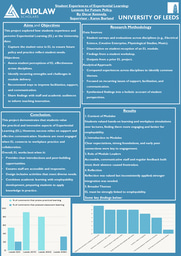
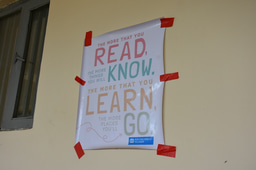
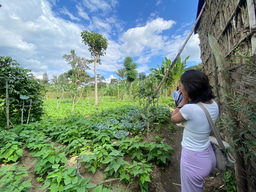
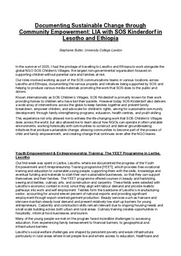
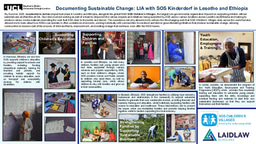
Please sign in
If you are a registered user on Laidlaw Scholars Network, please sign in